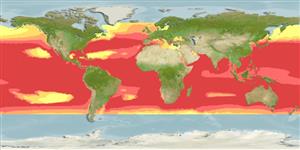Common names from other countries
分类 / Names
俗名 | 同种异名 | Catalog of Fishes(属, 种) | ITIS | CoL | WoRMS | Cloffa
Environment: milieu / climate zone / depth range / distribution range
生态学
海洋; 海洋洄游的; 深度上下限 0 - 260 m (Ref. 9340), usually 0 - ? m (Ref. 55287). 熱帶; 15°C - 30°C (Ref. 168); 63°N - 47°S, 180°W - 180°E
Cosmopolitan in tropical and warm-temperate waters. Not found in the Black Sea. Highly migratory species,
全球分佈於熱帶與溫帶-溫帶水域。 不出現在地中海東部 (參考文獻 28950) 與黑海。 高度遷移的種,1982年海事法會議的附件一.(參考文獻 26139)
Length at first maturity / 大小 / 重量 / 年龄
Maturity: Lm 41.3, range 40 - 45 cm
Max length : 110 cm FL 雄鱼/尚未辨别雌雄; (Ref. 89423); common length : 80.0 cm FL 雄鱼/尚未辨别雌雄; (Ref. 168); 最大体重: 34.5 kg (Ref. 168); 最大年龄: 12 年 (Ref. 168)
背棘 (总数) : 14 - 16; 背的软条 (总数) : 14 - 15; 臀棘: 0; 臀鳍软条: 14 - 15; 脊椎骨: 41. This species is distinguished by the following characters: body fusiform, elongate and rounded; teeth small and conical, in a single series; gill rakers on first gill arch numerous, 53-63; D1 XIV-XVI, dorsal fins separated by a small interspace (not larger than eye), the second followed by 7-9 finlets; anal fin followed by 7-8 finlets; pectoral fins short, with 26-27 rays; 2 flaps (interpelvic process) between pelvic fins; body scaleless except for corselet and lateral line; a strong keel on each side of caudal-fin base between 2 smaller keels. Colour of back dark purplish blue, lower sides and belly silvery, with 4-6 very conspicuous longitudinal dark bands which in live specimens may appear as discontinuous lines of dark blotches (Ref. 9684).
腹鳍间的突起小而两裂的。 身体没有鳞片除了甲胄与侧线。 泳鳔不存在。 背部颜色较深带紫色的蓝色, 下侧与腹面银色的, 对在活体中可能呈现黑色斑块的连续线的六个非常显着的纵向深色条纹有四个。
Found in offshore waters; larvae restricted to waters with surface temperatures of 15°C to 30°C (Ref. 6390). Exhibit a strong tendency to school in surface waters with birds, drifting objects, sharks, whales and may show a characteristic behavior like jumping, feeding, foaming, etc. Feed on fishes, crustaceans, cephalopods and mollusks; cannibalism is common. Spawn throughout the year in the tropics, eggs released in several portions (Ref. 35388). Eggs and larvae are pelagic (Ref. 6769). Preyed upon by large pelagic fishes (Ref. 6885). Also taken by trolling on light tackle using plugs, spoons, feathers, or strip bait (Ref. 9684). Marketed fresh, frozen or canned (Ref. 9340, 9684 ); also dried-salted and smoked (Ref. 9987).
发现于离岸水域了; 仔鱼用对 30 °C 的 15 °C 的表面温度局限于水域了。 (参考文献 6390) 强烈地趋向于在水表群集伴随着鸟, 漂流目标,鲨鱼, 鲸而且可能显示一个特殊的行为类似跳跃, 进食,起泡沫, 等等捕食鱼,甲壳动物,头足类动物与软件动物; 嗜食同类是普遍。 被大的大洋性的鱼捕食了。 (参考文献 6885) 在使用人工饵,匙形假饵,条状诱饵的轻型渔具上也用拖钓捕获。 (参考文献 9684) 在市场上销售生鲜地了, 冻结或装于罐头;(参考文献 9340) 也乾燥盐腌而且烟熏.(参考文献 9987) 在热带中产卵全年度, 卵分好几次释出.(参考文献 35388)
In tropical waters, reproductively active female skipjack tuna spawn almost daily.全球分佈於熱帶與溫帶-溫帶水域。 不出現在地中海東部 (參考文獻 28950) 與黑海。 高度遷移的種,1982年海事法會議的附件一.(參考文獻 26139)
Collette, B.B. and C.E. Nauen, 1983. FAO Species Catalogue. Vol. 2. Scombrids of the world. An annotated and illustrated catalogue of tunas, mackerels, bonitos and related species known to date. Rome: FAO. FAO Fish. Synop. 125(2):137 p. (Ref. 168)
CITES (Ref. 128078)
Not Evaluated
人类利用
渔业: 高经济性; 游钓鱼种: 是的
工具
特别资料
下载 XML
网络资源
Estimates based on models
Preferred temperature (Ref.
115969): 13.3 - 29, mean 26.2 (based on 8934 cells).
Phylogenetic diversity index (Ref.
82804): PD
50 = 1.0000 [Uniqueness, from 0.5 = low to 2.0 = high].
Bayesian length-weight: a=0.01072 (0.00955 - 0.01202), b=3.10 (3.07 - 3.13), in cm Total Length, based on LWR estimates for this species (Ref.
93245).
营养阶层 (Ref.
69278): 4.4 ±0.5 se; based on diet studies.
回复力 (Ref.
120179): 中等的, 族群倍增时间最少 1.4 - 4.4年 (K=0.3-0.5; tm=2-3; tmax=12; Fec=61,516).
Prior r = 0.52, 95% CL = 0.35 - 0.79, Based on 9 full stock assessments.
Fishing Vulnerability (Ref.
59153): Moderate vulnerability (38 of 100).
Climate Vulnerability (Ref.
125649): Moderate vulnerability (41 of 100).
